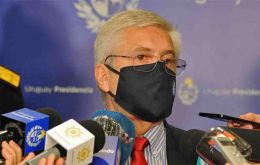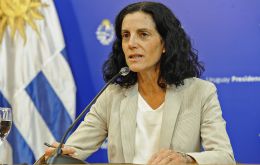MercoPress. South Atlantic News Agency
Uruguay
-
Monday, October 18th 2021 - 23:59 UTC
Brazil, Uruguay FMs stay mum after Montevideo meeting: rumors soar

Silence prevailed Monday in Montevideo after Uruguay's Foreign Minister Francisco Bustillo Monday welcomed his Brazilian counterpart Carlos França to discuss bilateral issues, particularly a possible 10% reduction of Common External Tariffs among Mercosur members.
-
Monday, October 18th 2021 - 10:05 UTC
Buenos Aires key to the region's future, says Pepe Mujica

Former Uruguayan President José “Pepe” Mujica said this weekend in a newspaper interview that the future of the River Plate area was at stake and it hinged on whatever happens in the Argentine capital.
-
Monday, October 18th 2021 - 09:03 UTC
Uruguay saves money with environment-friendly electricity

Uruguay has become the second country in the world when it comes down to wind-generated electricity, thanks to 43 eolic parks which produce a third (33%) of the electricity consumed nationwide, which has represented savings above US $ 125 million in 2020 alone.
-
Friday, October 15th 2021 - 09:59 UTC
Uruguay to make vaccination an option for tourists after borders reopen

Uruguay's Tourism Minister Tabaré Viera Thursday announced his country would include COVID-19 vaccination to incoming foreign travellers when the country's borders are fully reopened.
-
Friday, October 15th 2021 - 09:20 UTC
IDB 2022 Annual Assembly to be held in Uruguayan resort of Punta del Este

The Inter-American Development Bank (IDB) will hold its 2022 annual meeting of governors between March 17 and 20, 2022 at the most exclusive Uruguayan beach resort of Punta del Este, it was announced this week in Washington DC.
-
Thursday, October 14th 2021 - 08:40 UTC
Uruguayan President highlights the importance of freedom

Uruguay's President Luis Lacalle Pou was highly praised for his speech before rural producers of his country and Argentina, where he addressed the issue of freedom.
-
Wednesday, October 13th 2021 - 09:12 UTC
Survey shows 77% of Uruguayans are OK with the COVID-19 vaccine requirement to attend stadiums, movies or concerts

A recent study by pollster Cifra has shown 77% of Uruguayans were in favour of anti-COVID-19 vaccination requirements for people willing to attend football stadiums, movie theatres or concerts, it was announced Tuesday in Montevideo.
-
Tuesday, October 12th 2021 - 09:32 UTC
Uruguay: IMF recommends addressing skill-mismatch between the labour force and new jobs

Last week we published an IMF preliminary statement on the situation of the Uruguayan economy in which it praised the government's handling of the pandemic underlining Uruguay's solid institutions, well-functioning democracy and a high degree of social cohesion.
-
Tuesday, October 12th 2021 - 08:48 UTC
Uruguayan authorities halt second beef shipment to China which failed to meet quality standards

Uruguay's Agriculture and Livestock Minister Fernando Mattos explained during the weekend that in addition to a batch of Uruguayan beef turned down by China at the port of destination for containing excessive amounts of fat, a similar case had been detected in the port of Montevideo, which was ready to be shipped.
-
Monday, October 11th 2021 - 09:52 UTC
Argentine FM hold a successful meeting with Brazil's Economy Minister as part of his mission rebuilding Mercosur ties

Argentine Foreign Minister Santiago Cafiero, Ambassador Daniel Scioli and Productive Development Minister Matías Kulfas Saturday met in Brasilia with Brazilian Economy Minister Paulo Guedes to deepen the new economic ties between the two countries
